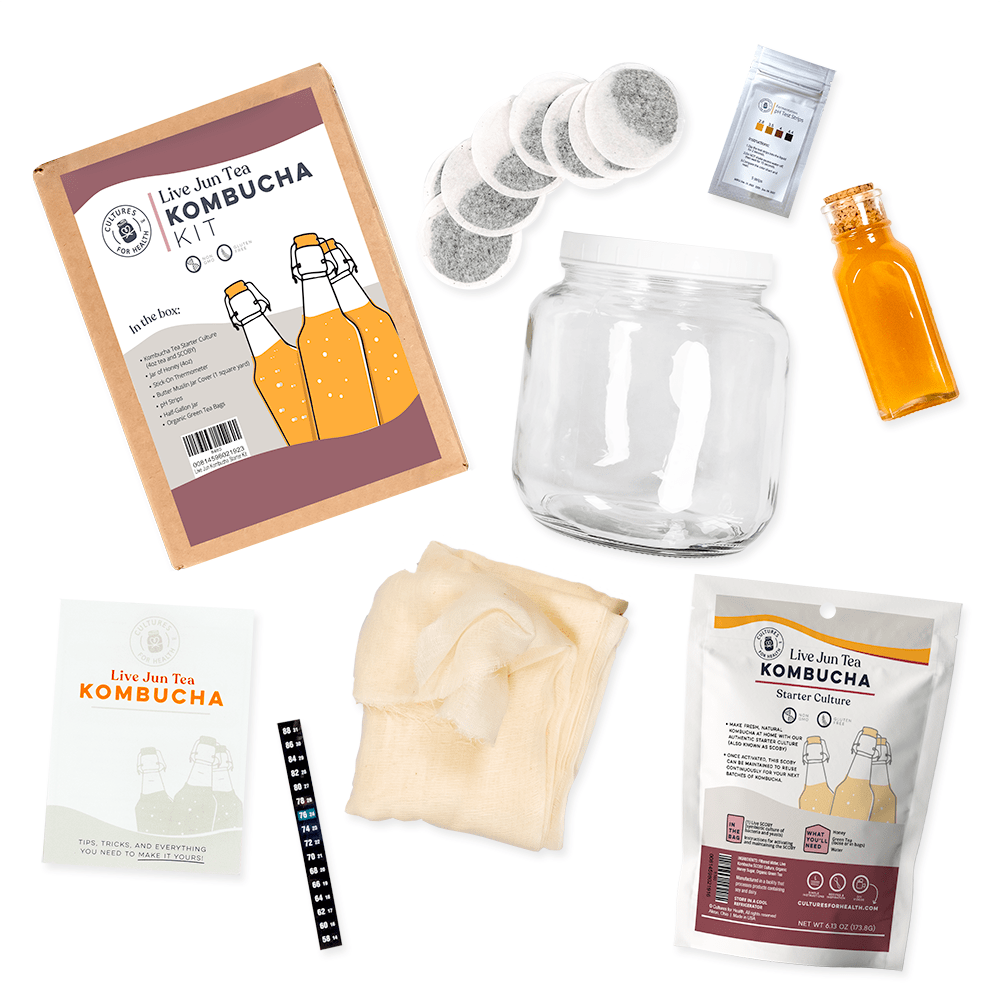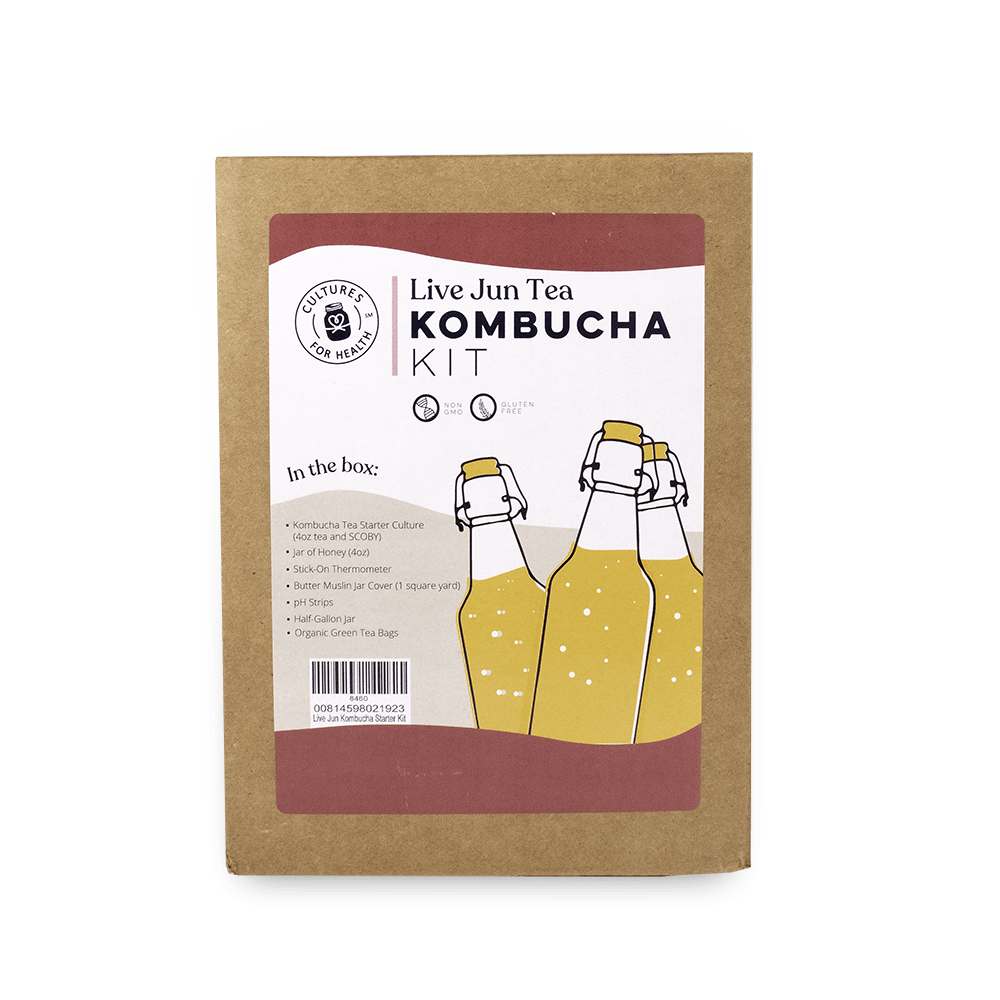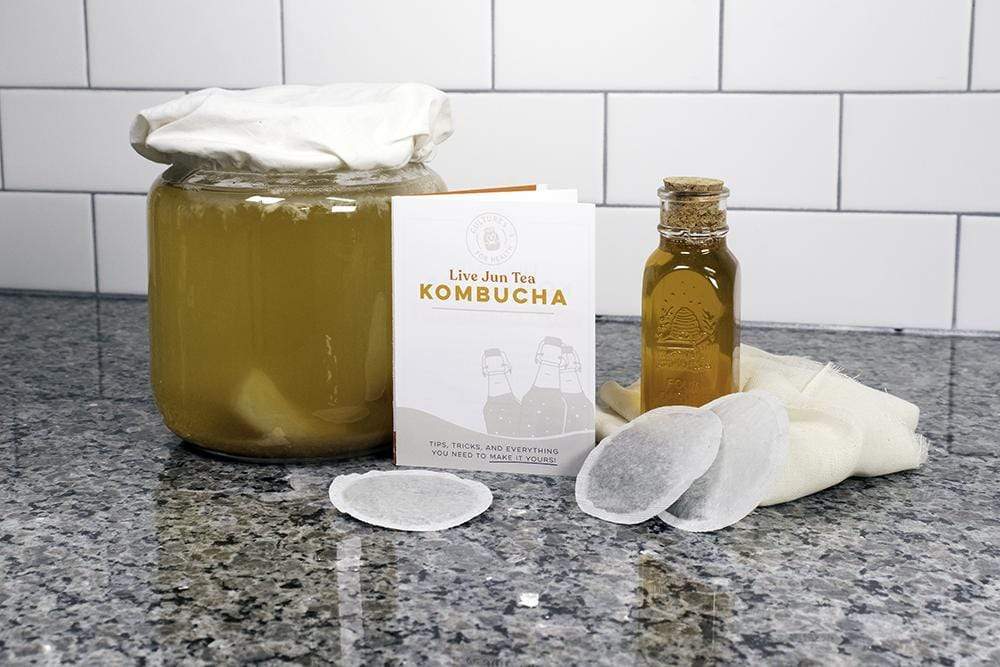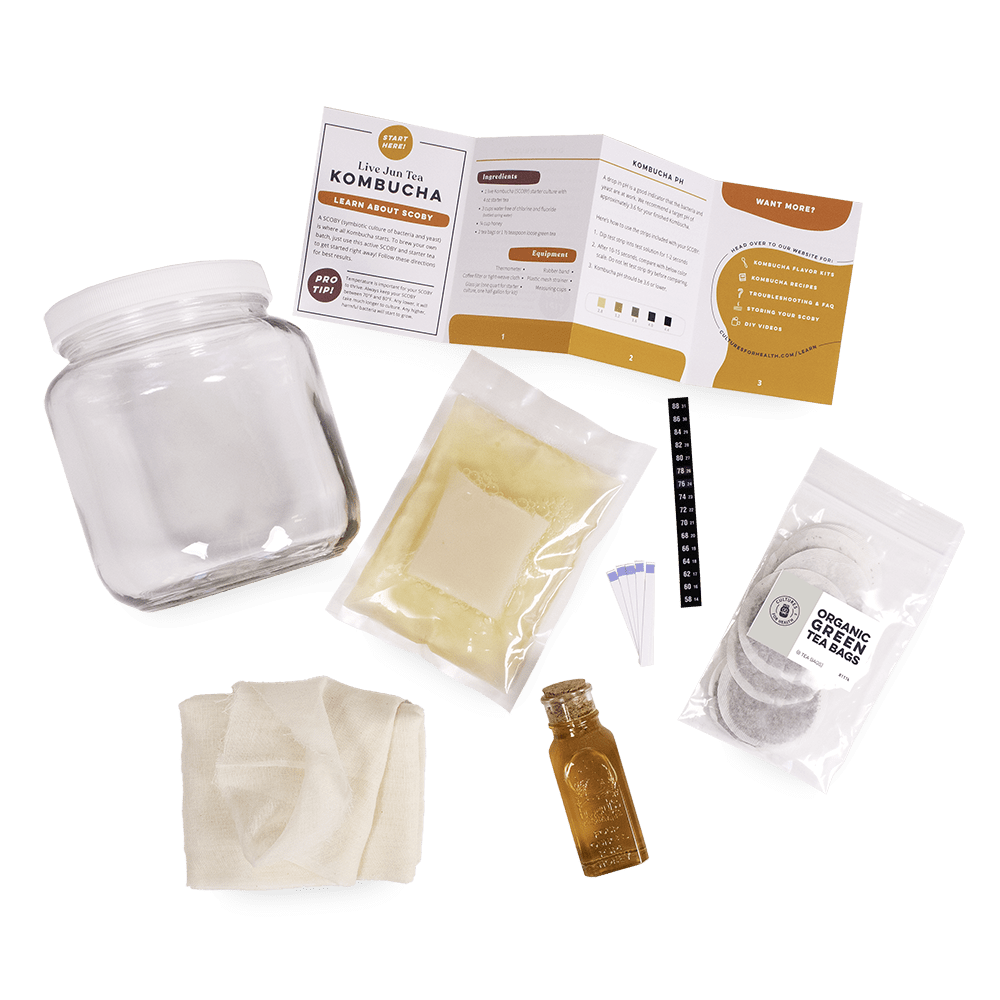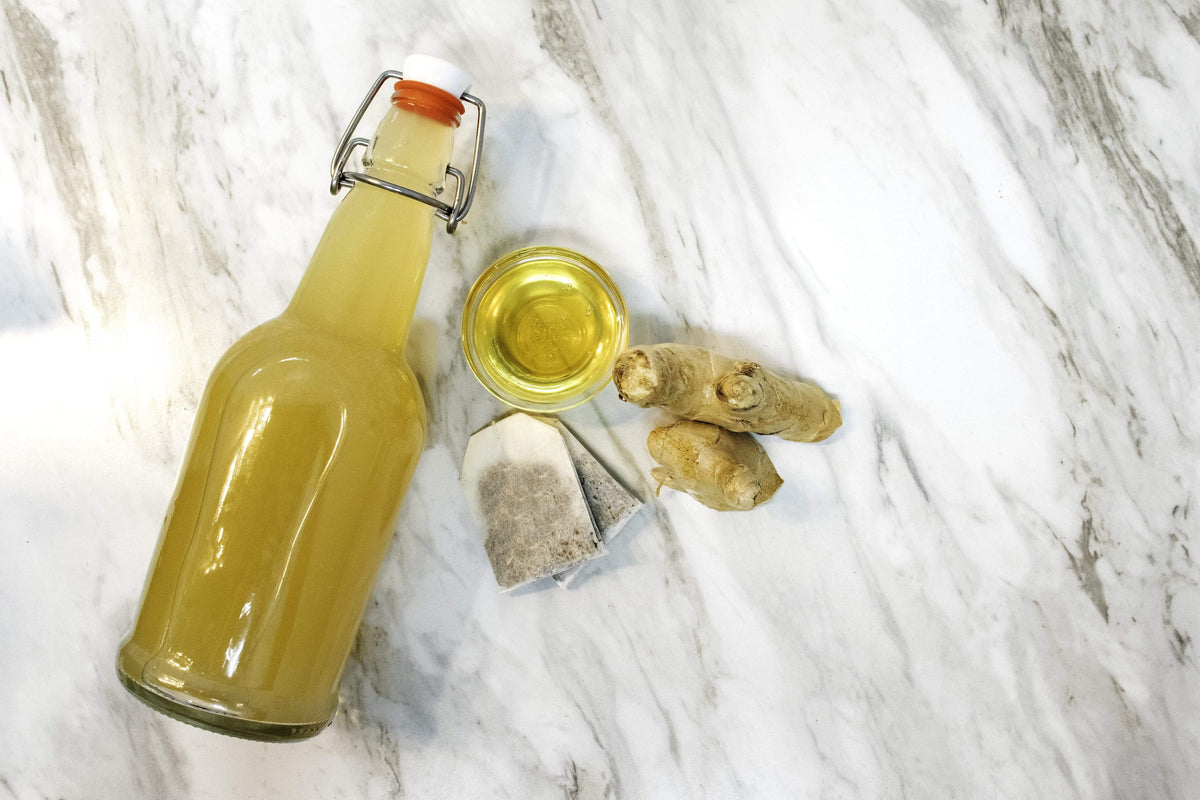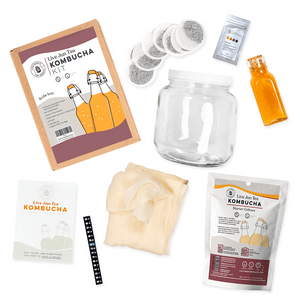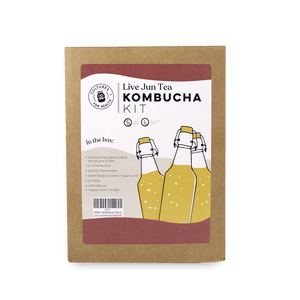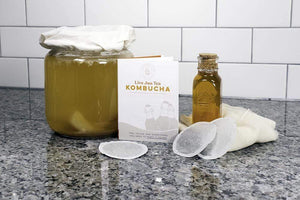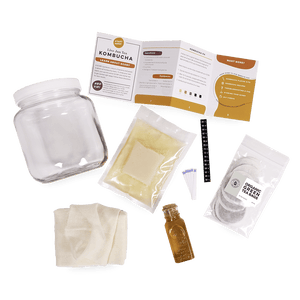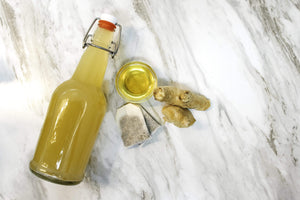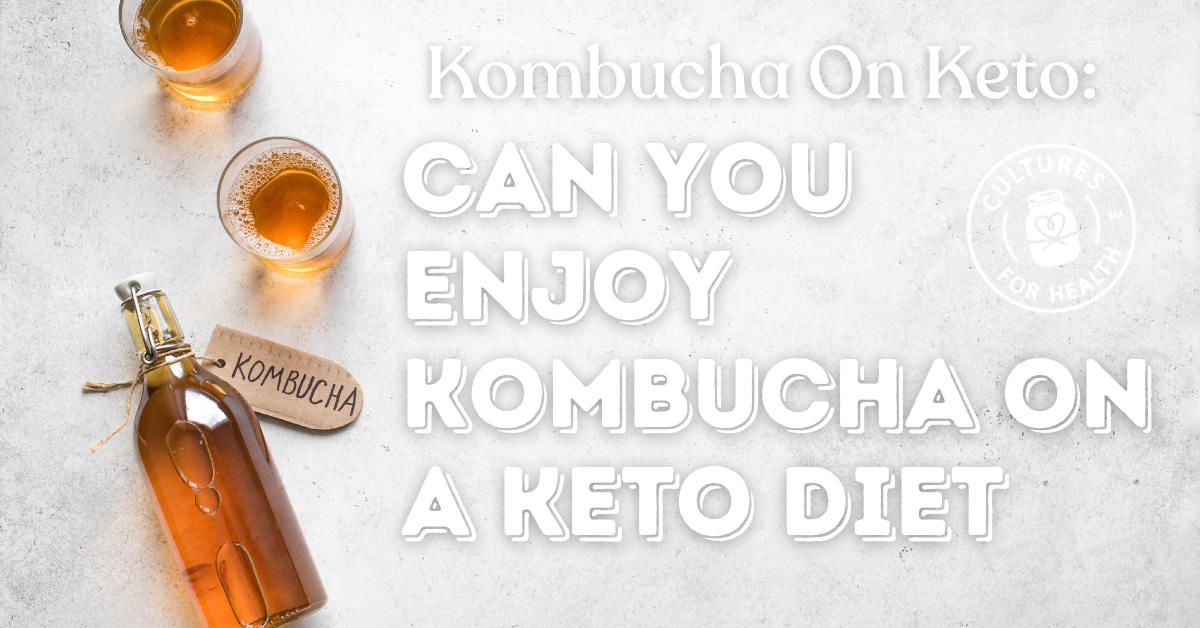
Growing more and more popular in the world of fermented beverages is Jun tea. This probiotic beverage is packed with bacteria, yeasts, and organic acids; much like its sister beverage kombucha tea. Indeed, these two beverages share many attributes. Many call Jun simply a “Honey-Sweetened Green Tea Kombucha”. Others claim it is a unique strain of culture unto itself.
Download our Kombucha Guide with tips and tricks to show you how to make delicious Jun Tea with a Kombucha Scoby.
MYSTERIOUS ORIGINS OF JUN TEA
Unlike kombucha tea, whose roots seem to firmly point back to a source in Russia, Jun has a lot of conflicting information in regards to its origin. Some claim it can be traced back to areas of Asia while others claim it is simply a branch from the kombucha tree. It seems clear that we probably cannot know for sure.
One historical argument for Jun having its own culture rather than being simply kombucha cultured in a different medium is the historical analysis of the tea and sugar source. This argument states that the modern refined sugar used in making kombucha would not have been easily or widely available in the earliest centuries. Likewise, black tea is a more processed (fermented) version of green tea.
We may be able to conclude from this that the concept of a Jun or Kombucha-type fermented tea made from readily available pre-industrialized ingredients such as fresh green tea and honey from a local hive were precursors to the kombucha tea we now know.
The very specific origins, however, have yet to be clearly presented.

THE JUN SCOBY
Just as the origins of the Jun beverage are shrouded in mystery, the debate over the source of the Jun SCOBY is lively. In general, there are two camps.
The first line of thinking is that Jun has its own SCOBY which has never crossed paths with the kombucha culture. It originated in a different geographical region and was passed down, in a medium of raw honey and green tea, from generation to generation. This camp states that Jun cannot be made from a kombucha SCOBY and therefore one must seek out a pure Jun SCOBY, which can be hard to find.
Another line of thinking is that Jun is a branch from the kombucha family tree. Essentially, a kombucha SCOBY can be "trained" over time to culture any sweetened tea medium. Jun, therefore, is simply a kombucha (or kombucha-like) SCOBY that has evolved to culture in a medium of raw honey and green tea. This camp allows for the purchasing of a “trained” Jun SCOBY or the purchasing and training of a kombucha SCOBY through the use of raw honey and green tea.
One other point of contention between the two camps is the exposure to air or the aerobic nature of the ferment. Like kombucha, Jun is generally cultured with exposure to air through a permeable surface. Jun purists point out that the interaction between what might be considered a “pure” culture and the surrounding air changes the microbial makeup of the Jun, most specifically the yeasts involved.

JUN VS. KOMBUCHA
These two fermented teas have much in common, which might explain why the two probiotic-rich beverages are often lumped together.
Ingredients
The ingredients used in making Jun and kombucha are one of the primary differences between the two. While kombucha generally utilizes black tea and refined sugar as its fermentation medium, Jun is cultured with green tea and raw honey.
Taste
The taste of the two fermented beverages reflects that disparity in ingredients. While very mature kombucha can have a strong vinegar note to it, Jun tends to be a bit less acidic. Jun is generally lighter and fizzier in flavor, due both to its ingredients and its microorganisms.
Alcohol Content
The alcohol content of Jun is generally higher than kombucha. This may be due to the differences in the sugars used to culture the two beverages.
Whereas cane sugar contains 50% glucose and 50% fructose, honey only contains 30% glucose, less than 40% fructose, and about 20% of a mix of other sugars. This difference, in combination with the yeasts at play, produces a higher alcohol content.
Fermentation Time
The fermentation time of kombucha is much longer than that of Jun. Jun tea often takes only half of the time to ferment as kombucha. The other factor in this is that Jun prefers to culture at a cool room temperature while kombucha prefers it 5-10 degrees warmer.

CONVERTING A KOMBUCHA SCOBY TO UTILIZE GREEN TEA AND HONEY
As with all cultures, any changing in feeding regimen must be done with the utmost care. Use an extra SCOBY for this practice, saving others for backups which you will then feed with black tea and sugar as usual.
It is best to slowly introduce new ingredients to cultures. For that reason, it is recommended that you start by replacing 20% of the sugar and black tea with honey and green tea, respectively. Once that is successful, increase these substitutions to one-third of the ingredients.
The next steps are to increase these substitution amounts to one-half, then two-thirds, then three-quarters, and then, finally, to 100%. This slow approach should help your Kombucha SCOBY adapt to the new ingredients over time.
Each time you add more green tea and honey, check the health and vitality of the SCOBY and the fermented tea. If it is less than thriving, repeat that same level of green tea and honey until the process goes off without a hitch.
Troubleshooting Tips for Jun
Keep in mind that changing the SCOBY's environment can sometimes have unpredictable impacts on the SCOBY. While the method above has been tried and tested, it is possible that it may not work with every kombucha SCOBY (this unpredictability isn't uncommon when working with living ingredients.) Use a backup SCOBY and if it fails, don't be discouraged from giving it another try.
HOW TO BREW JUN TEA WITH A KOMBUCHA SCOBY
If you would like to try brewing Jun by converting a kombucha SCOBY to feed on honey and green tea, the process is almost identical to brewing kombucha, with only a few minor tweaks.
Ingredients
- 2 green tea teabags or 2 teaspoons loose-leaf green tea
- Scant 8 cups water
- ½ cup raw honey
- 1 kombucha SCOBY converted to honey and green tea (as noted above)
- ½ cup Jun kombucha from a previous batch
Live Jun Tea Kombucha Starter Kit
Instructions for Brewing Jun Tea
- Boil the water and add the tea.
- Steep the tea for 3-5 minutes. The longer the tea steeps the stronger “green” flavor the final product will have.
- Remove tea and set aside to cool to room temperature. Stick-on thermometers are an easy way to check the temperature of your liquid.
- Once completely cooled, stir in the raw honey until completely dissolved.
- Pour this mixture into a ½ gallon container and add the SCOBY and previously cultured Jun kombucha.
- Cover the container with a cloth, coffee filter, or butter muslin secured with a rubber band or canning ring.
- Allow to the culture at 70-80 ° for 4-7 days, tasting for acidity starting at day four.
- Once pleasantly sour and still just a little sweet, your Jun kombucha is ready to drink!
- Save 1/2 cup of your Jun kombucha then repeat steps 1 through 8 to start a new batch.
Jun Tea Second Fermentation
For a second fermentation, decant the finished Jun into airtight bottles and add fruit or juice. Allow this to culture for 1-3 days at room temperature before refrigerating.
Jun is generally more carbonated than kombucha so just be extra careful to check for carbonation and avoid prolonged second fermentation periods when temperatures are warm.
WHAT'S NEXT?
Now that you know a little more about Jun tea you're nearly ready to make it at home. To help you make sure you have all the supplies you need at home, Cultures for Health is here to help you with all of your fermentation needs.
With the largest selection of kombucha starters and tools, we have everything you need and more. Our best selling option is our Jun Tea Kombucha Starter Kit which has everything you need to start making kombucha at home. This starter kit includes:
- 1 - Kombucha Tea Starter Culture (1 SCOBY)
- 1 - Bag of Organic Cane Sugar (1 cup bag)
- 1 - Bottle of Organic Distilled White Vinegar (8 fl. oz. bottle)
- 1 - Bag of Organic Black Tea Bags (8 tea bags)
- 1 - Stick-On Thermometer
- 1 - Butter Muslin Jar Cover (1 square yard)
- 1 - Vial of pH strips (vial of 25 strips)
Click here to start making your own kombucha at home today!
Download our free Kombucha guide and recipe today to start your Jun Tea brewing journey!
WE MAKE IT EASY
At Cultures for Health, we believe that anyone--on any diet and at any skill level--can make and enjoy the benefits of traditional fermented foods. Through our product offering, recipes, tutorials, and how-to videos, we'll give you the tools you need to nourish your family and live healthily.
You Can Do This.
Find everything you need to get started with one of our DIY Kits and our Fermentation Kits.













